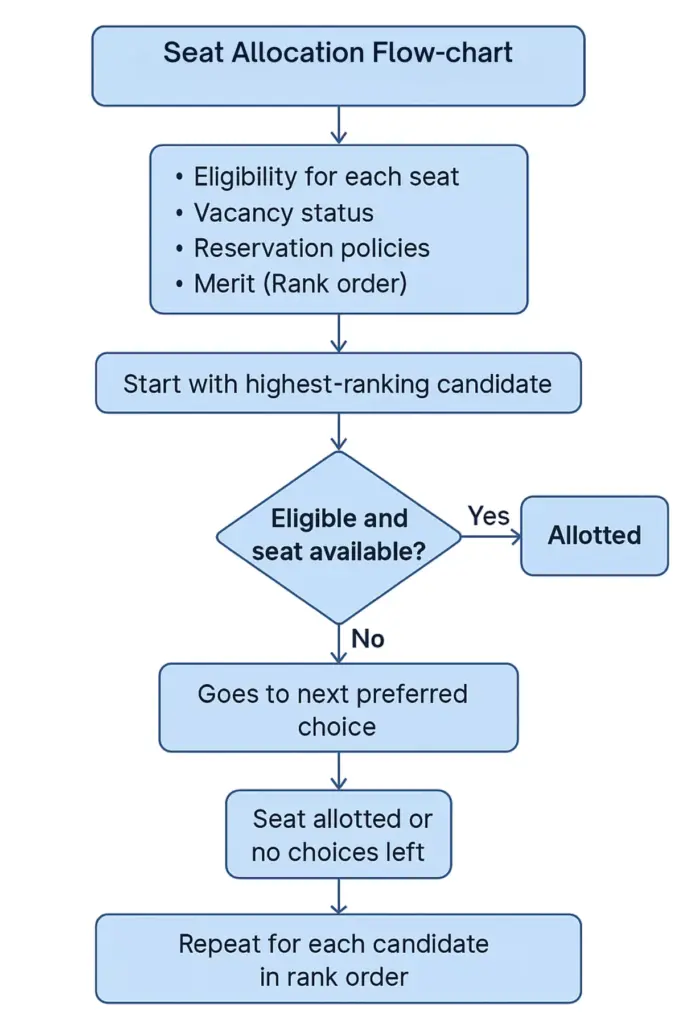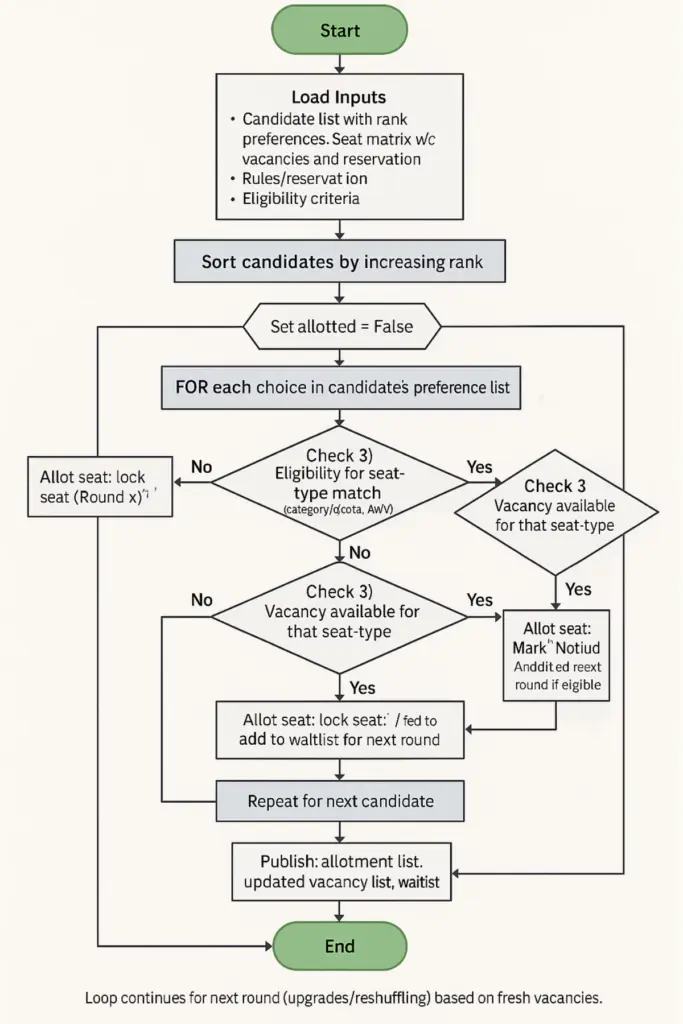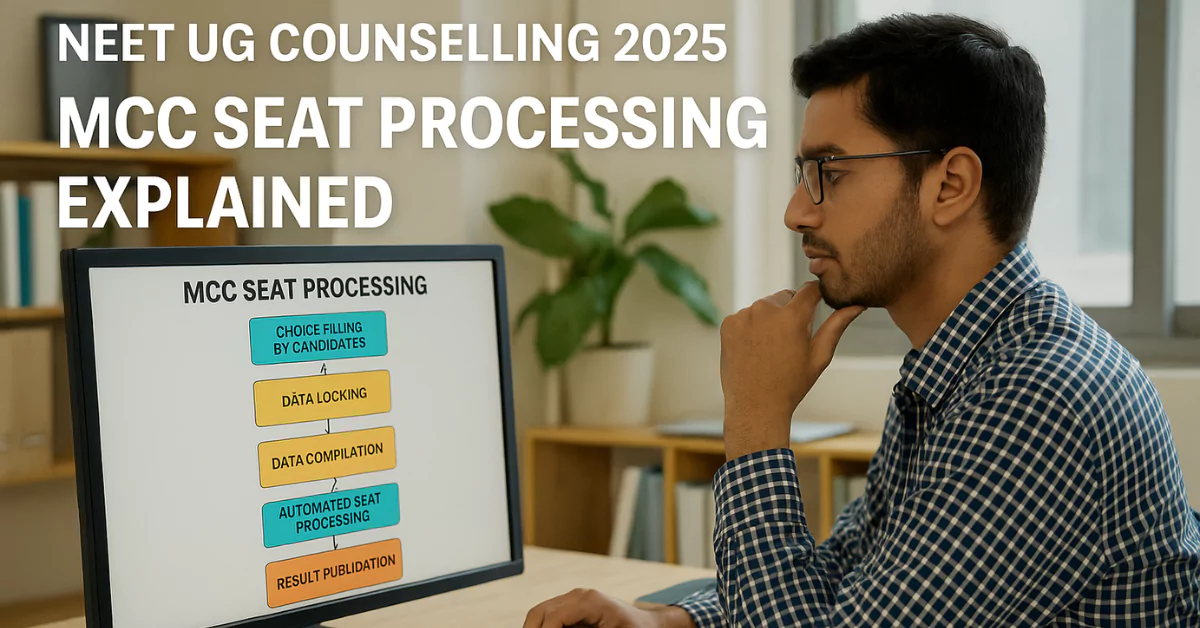MCC Seat Processing: The NEET UG Counselling 2025 is underway. The Medical Counselling Committee (MCC) has already closed MCC Round 1 choice filling. Now, MCC Seat Processing has started. Some of the students must be wondering what it is.
MCC plays a crucial role in seat allotment for All India Quota (AIQ) and certain other quotas. This is the most important phase, so students must understand the right strategy for NEET 2025 MCC choice filling to optimally use MCC Seta Processing.
But many candidates don’t fully understand how MCC seat processing works.
It is an online counselling methodology where seats are allotted based on a fixed algorithm.
This article breaks down the entire process of MCC seat allotment, or MCC seat processing, in simple language, a detailed flowchart and algorithm design.
What is MCC?
The Medical Counselling Committee (MCC) is a government body under the Directorate General of Health Services (DGHS), Ministry of Health and Family Welfare. It is responsible for conducting NEET-based counselling for:
- 15% All India Quota (AIQ) seats in government medical colleges
- 100% seats in Deemed Universities
- AIIMS & JIPMER
- Central Universities (e.g., DU, AMU, BHU)
- ESIC medical colleges
- Armed Forces Medical College (AFMC)
What is Seat Processing in NEET Counselling?
Seat processing is the stage where MCC’s system allocates seats to candidates based on their:
- NEET UG Rank
- Category (GEN, OBC, SC, ST, EWS, PwD, etc.)
- Quota (AIQ, NRI, CW, etc.)
- Domicile (if applicable)
- College and course preferences (Choice Filling)
- Seat availability in the selected college/course
The process is conducted using an automated software system designed to follow all reservation and eligibility rules.
MCC Seat Processing Flow-chart

How MCC Seat Processing Works: Step-by-Step
Step 1: Choice Filling by Candidates
Candidates log in to the MCC portal and fill choices of colleges and courses in order of preference. The seat allotment depends heavily on the choices submitted.
Step 2: Data Locking
Once the choice filling period ends, the portal locks all entries. No more changes can be made.
Step 3: Data Compilation
MCC collects data such as:
- NEET UG score and All India Rank of each candidate
- Category/sub-category
- Nationality (Indian/NRI)
- Choice preferences
- Availability of seats in each college/course/category
Read Also: NMC Fee Guidelines: 50% Private Medical Seats at Govt College Fees
Step 4: Automated Seat Processing
The seat allocation software processes all this data using an algorithm that checks:
- Eligibility for each seat
- Vacancy status
- Reservation policies
- Merit (Rank order)
The software starts with the highest-ranking candidate and checks their first choice:
- If eligible and seat available → Allotted
- If not available → Goes to next preferred choice
- This continues until a seat is allotted, or no choices are left
This is done for each candidate in order of NEET UG rank until all seats are processed.
Step 5: Result Publication
Once the software finishes processing:
- MCC publishes the Provisional Seat Allotment Result (for checking errors)
- Then, the Final Seat Allotment List is released
- Candidates can download their allotment letter
Step 6: Reporting to College
Candidates must report to the designated college (either online or in person, depending on the round) within the specified timeframe to confirm their admission.
MCC Seat Processing Algorithm

What Happens in Subsequent Rounds?
If you don’t get a seat in Round 1, you can participate in:
- Round 2
- Round 3
- Stray Vacancy Round
During each round:
- Vacant seats from previous rounds are reprocessed
- Candidates may be upgraded to a better choice (if opted for)
- New choices may be filled in Round 3 and Stray Rounds
Note: Once a seat is accepted and documents are submitted, you cannot participate in further rounds for that quota (depending on rules and round).
Also Read: NMC MARB Guidelines 2024: How to Start a New Medical College & Increase MBBS Seats in India
Key Factors That Influence Seat Processing
Here’s what the seat processing software considers:
| Factor | Role |
|---|---|
| NEET UG Rank | Determines merit position |
| Category | Affects eligibility for reserved seats |
| Quota | AIQ, Central, Deemed, etc. – different seat pools |
| Choice Order | The order you list preferences matters |
| Seat Availability | Only vacant seats are processed |
| Eligibility | Must meet college and course criteria |
| Disability (PwD) status | Special reservation rules apply |
| NRI documents (if applicable) | Verified before NRI seat processing |
Is Seat Processing Manual?
No. MCC seat allotment is fully computerised, ensuring fairness and transparency. However, colleges must conduct document verification and eligibility checks during reporting.
MCC Seat Processing: Example Scenario
Candidate A
- NEET Rank: 2,345
- Category: OBC-NCL
- Applied under: AIQ
- Choice 1: Maulana Azad Medical College, Delhi
- Choice 2: B.J. Medical College, Pune
- Choice 3: AIIMS Bhopal
If a seat is available in MAMC and the candidate is eligible, they’ll be allotted that. If not, the system checks BJMC, then AIIMS Bhopal, and so on.
Upcoming Seat Processing Timeline (NEET UG 2025 Example)
| Event | Date |
|---|---|
| Choice Filling Ended | Aug 4, 2025 |
| Seat Processing | Aug 5, 2025 |
| Round 1 Result | Aug 6, 2025 |
| Reporting to College | Aug 7–11, 2025 |
Tips for Candidates
- Fill in as many choices as possible in the correct order of preference
- Understand your category and quota eligibility
- Keep documents ready for verification
- Follow the MCC website, mcc.nic.in, regularly for updates
- Don’t rely only on high-demand colleges; include practical options
MCC seat processing is a crucial and highly technical part of NEET counselling. It ensures that every candidate gets a seat based on merit, choice, and reservation rules, using a transparent computerised process. Understanding how it works helps aspirants make informed decisions during counselling and avoid costly mistakes.

